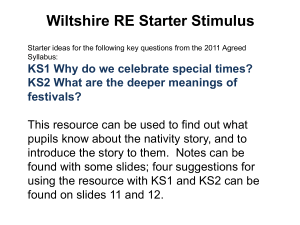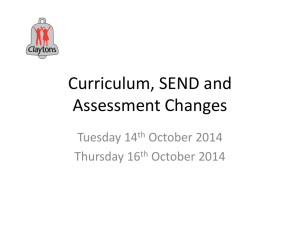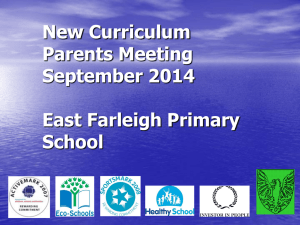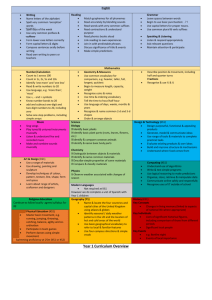Science Policy
advertisement
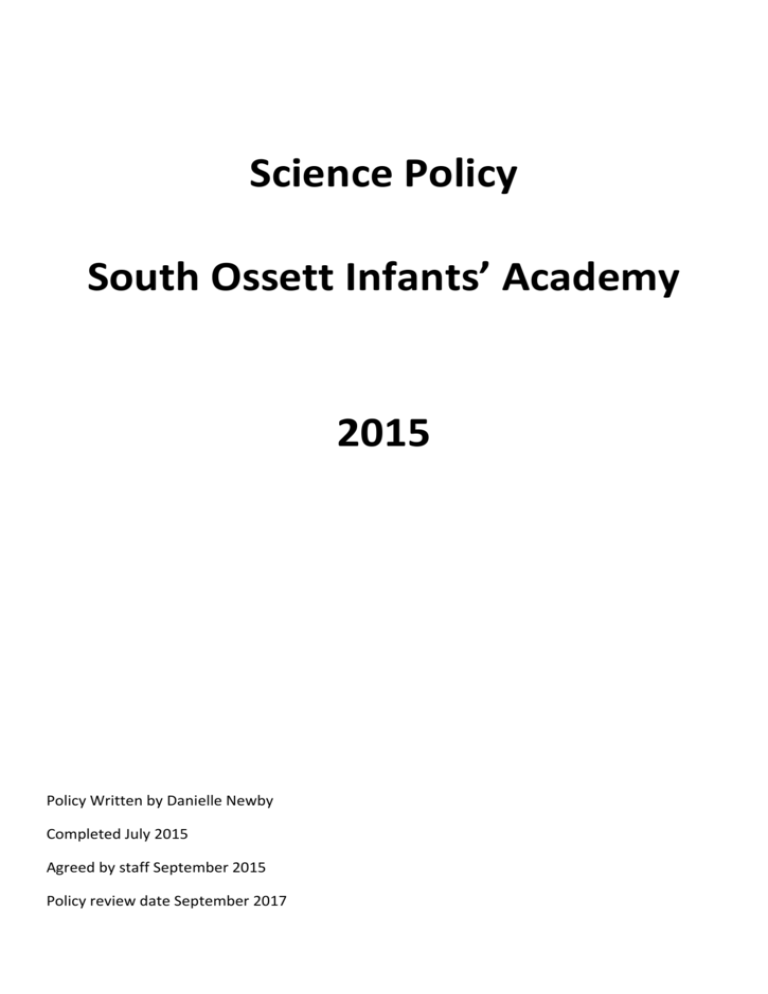
Science Policy South Ossett Infants’ Academy 2015 Policy Written by Danielle Newby Completed July 2015 Agreed by staff September 2015 Policy review date September 2017 Introduction Definition of science: Science is a body of knowledge built up through the experimental testing of ideas. Science is also a practical way of finding reliable answers to questions we make about the world. Rational: ‘A high quality science education provides the foundations for understanding the world through the specific disciplines of biology, chemistry and physics. Science has changed our lives and is vital to the world’s future prosperity, and all pupils should be taught essential aspects of the knowledge, methods, processes and uses of science. Through building up a body of key foundational knowledge and concepts, pupils should be encouraged to recognise the power of rational explanation and develop a sense of excitement and curiosity about natural phenomena. They should be encouraged to understand how science can be used to explain what is occurring, predict how things will behave, and analyse cause.’ (taken from ‘maintain curiosity’). Aims: Science teaches an understanding of natural phenomena. It aims to stimulate a child’s curiosity in finding out why things happen in the way they do. It teaches methods of enquiry and investigation to stimulate creative thought. Children learn to ask scientific questions and begin to appreciate the way science affects themselves and their environment. KS1 The national curriculum for science aims to ensure that all pupils: Develop Scientific knowledge and conceptual understanding through the specific disciplines of biology, chemistry and physics Develop understanding of the nature, processes and the methods of science through different types of science enquiries that help he to answer scientific questions about the world around them. Are equipped with the scientific knowledge required to understand the uses and implications of science, today and for the future. Working scientifically During KS1, pupils are taught to use the following practical scientific methods, processes and skills through the teaching of the programme of study content Asking simple questions and recognising that they can be answered in different ways Observing closely, using simple equipment Performing simple tests Identifying and classifying Using their observations and ideas to suggest answers to questions Gathering and recording data to help in answering questions. Early Years Foundation stage The EYFS is split into two areas of learning: prime and specific areas. Science comes under the specific area and is known as ‘Understanding the World.’ Understanding the World is then split into 3 categories: People and Communities, The World and Technology. Children are given a wide range of first hand activities and experiences that encourage exploration, observation, problem solving, prediction, critical thinking, decision making and discussion to develop scientific enquiry, knowledge and skills. Methodology We use a variety of different teaching and learning styles in our science lessons. Our principle aim is to develop children’s knowledge, skills and understanding. Sometimes we do this through whole class teaching, while at other times we engage the children in an enquirybased research activity. We encourage children to think creatively and to ask, as well as answer, scientific questions. They engage in a wide range of problem solving activities. We use the ‘Open Futures curriculum’ to support the teaching and learning of science. Planning In Lower and Upper Foundation stage, science is an integral part of our ‘projects’. The curriculum is delivered primarily from the 30-50mths and 40-60mth statements within ‘Understanding the World’ of the Development Matters ages and stages of development. At Key Stage 1 the National Curriculum framework is used to inform planning. KS1 plan topics that children access during weekly teaching sessions. Both Class One and Class Two have ‘Enquiring Mind’ sessions that support the ‘awe and wonder’ of Science. Differentiation We recognise that there are children of widely abilities in all classes and we ensure that we opportunities for all children by matching the the ability of the child. We achieve this in a different scientific provide suitable learning challenge of the task to variety of ways by: setting tasks which are open ended and can have a variety of responses setting tasks so children can master their skills in working scientifically using the continuous provision both indoors and outdoors so children can master their skills the grouping of pupils for practical activities takes into account their strengths and areas for development and ensures that they all take an active part in the task for pupils with SEN we set suitable learning challenges and respond to each child’s different needs What good Science teaching looks like at our school At South Ossett Infant Academy children say they learn best when Science is: ‘fun and exciting’ ‘doing activities’ ‘going outside’ ‘looking at nature’ ‘going bug hunting’ ‘finding and bashing different poos’ Links across the curriculum Science actively promotes the skills of reading, writing, speaking and listening. We use big books (nonfiction and fiction books) as a way to link Literacy within our Science Lessons. Science contributes to the teaching of Mathematics in a number of ways; children weigh, measure, gather and record data and learn to use and apply number. Through working on investigations, they learn to estimate, predict, observe accurately, make comparisons and record events. Children use Computing in Science to support their investigations and findings; they select and analyse information from the internet, use ‘easi-scope’ digital viewers to observe and make comparisons between objects. We use ‘Open Futures’ to support our teaching across the curriculum, this includes ‘grow it’, ‘cook it’ and ‘ask it.’ Assessment and recording In Foundation Stage we assess Science within ‘Understanding the World’ against Development Matters ages and stages of development and the Early Learning Goals in which we make a best fit judgment on whether the children are emerging, expected or exceeding in this area. The type of evidence we gather to support our judgments are mainly through photos, practitioners’ observations and comments that the children make combined with practitioner knowledge. During the academic year 2015-16 KS1 will introduce assessment grids as used in maths and literacy. Reporting to parents Parents are offered a consultation session each term where science may be discussed, describing each child’s attitudes to Science, their progress in working scientifically and their understanding of Science concepts. Science is part of the annual report sent home in the summer term. Health and Safety For all practical activities due care and attention is paid to health and safety issues and this will be identified in planning and risk assessments. Monitoring and Evaluating The monitoring and evaluation of Science will be done by the Science Coordinator; this will include book scrutiny, learning walks, drop in sessions and science lesson observations. Feedback will be given to class teachers and points for development will be identified. Science Enrichment: Awe and Wonder “Awe and wonder” is developed in a variety of ways for example - “Living Eggs” and keeping the hens Our Outdoor and Continuous provision in both KS1 and Foundation Stage Enquiring Minds Whole School Science day Science Family Learning morning (as available) Opportunities that arise due to natural phenomena, for example the solar eclipse and hail stones the size of golf balls.
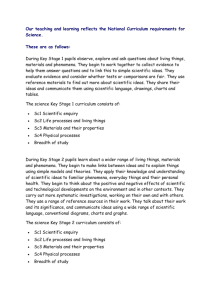
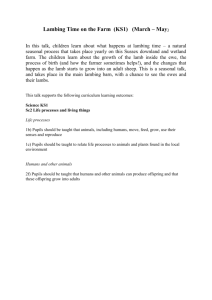
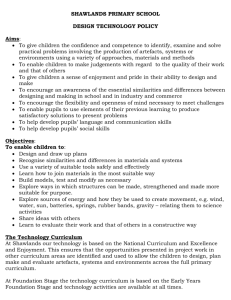
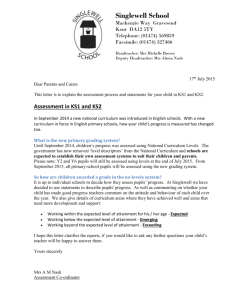

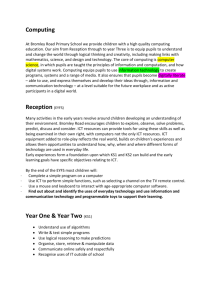
![afl_mat[1]](http://s2.studylib.net/store/data/005387843_1-8371eaaba182de7da429cb4369cd28fc-300x300.png)

